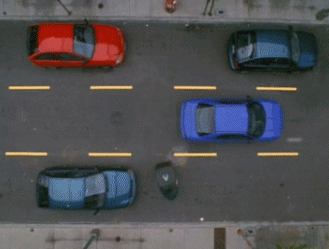Sisyphus’ task was a long, slow and steady one, until the Internet and smartphones turned it into a game of Frogger. While the King of Ephyra could never win, he at least had time for deliberation, where we’re reduced by our gadgets to a constant state of anticipation, only as good as our next like, follow or text. It’s abeyance, interrupted every few seconds by a notification that can never satisfy us for very long. It’s a food that makes us hungrier.
In a really good New York Review of Books piece about a slate titles on technology, Edward Mendelson writes about many aspects of our new normal, a good and bad thing, including how we live in perpetual anxiety today, how we’ve become the harried characters inside the screen, waiting for some message or recognition to deliver us, though it never can. Two short excerpts follow.
Computers and smartphones bring to daily life some of the qualities of another artifact of the digital era: the video game in which a player sustains an anxious state of vigilance against sudden unpredictable intrusions that must be dealt with instantly at the risk of virtual death. This too has its benefits: drivers who grew up playing video games are reportedly quicker than others to respond to sudden danger, more capable of staying alive.
Dante, always our contemporary, portrays the circle of the Neutrals, those who used their lives neither for good nor for evil, as a crowd following a banner around the upper circle of Hell, stung by wasps and hornets. Today the Neutrals each follow a screen they hold before them, stung by buzzing notifications. In popular culture, the zombie apocalypse is now the favored fantasy of disaster in horror movies set in the near future because it has already been prefigured in reality: the undead lurch through the streets, each staring blankly at a screen.•
After [Bernard E.] Harcourt’s book appeared, Apple and the state came into conflict when the FBI tried to force Apple to make it possible to decrypt a terrorist’s iPhone. Apple holds to the largely admirable view that it should provide no means to invade anyone’s privacy, while its software is designed to intrude on everyone’s privacy with messages, ads, alerts, and notifications, and to record and sell everything spoken to the phone’s built-in “digital assistant,” all in the name of convenience and profit.1 The knowledgeable and elite can reduce these intrusions to the extent that Apple permits, and the strong-willed can turn off their phones, but Apple relies on everyone else’s passive acceptance of interruption and eavesdropping in order to keep its profitable data moving.
Harcourt describes a new kind of psyche that seeks, through its exposed virtual self, satisfactions of approval and notoriety that it can never truly find. It exists in order to be observed; it must continually create itself by updating its declared “status,” by revealing itself in Facebook narratives and Instagram images, while our “conscientious ethical selves” need to be reminded—by ourselves and others—to exist at all. Harcourt apparently does not expect such reminders to have much effect and concludes despairingly: “It is precisely our desires and passions that have enslaved us, exposed us, and ensnared us in this digital shell as hard as steel.”•
Tags: Edward Mendelson

